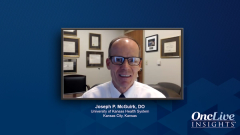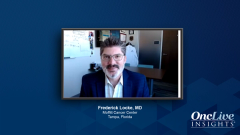
CAR T-Cell Therapy’s Impact on Lymphoma Management
Gain insights into CAR T-cell therapy's impact on lymphoma treatment through a historical perspective and mechanism of action.
Episodes in this series

Video synopsis is AI-generated and reviewed by OncLive editorial staff.
CAR T-cell therapy, a groundbreaking approach in lymphoma treatment, has reshaped the landscape of cancer care. A historical perspective is vital to understanding this revolutionary therapy. In 2017, the first CAR T-cell therapy, Kymriah, was approved for treating diffuse large B-cell lymphoma (DLBCL). This approval was a significant milestone in the field, offering hope for patients with relapsed or refractory DLBCL.
Three pivotal trials—ZUMA-1 (NCT02348216), JULIET (NCT02445248), and TRANSCEND (NCT02631044)—explored CAR T-cell therapy in the context of DLBCL, particularly in patients who had reached the third line of treatment. These trials involved different CAR T-cell constructs, each with distinct stimulatory domains, adding to the wealth of knowledge about CAR T-cell therapy's potential. The core idea behind CAR T-cell therapy is to harness the patient's own T cells, the immune cells responsible for recognizing and eliminating abnormal cells, including cancer cells. T cells naturally form an immunologic synapse with target cells when they detect abnormalities or differential antigen expressions. This interaction provides signals (signal 1 and signal 2) that stimulate T-cell expansion, attack, and the release of cytokines, which call in reinforcements for an immune response.
Cancer cells have evolved strategies to evade T-cell recognition, posing a challenge to immune responses. Nevertheless, advancements in T-cell biology have illuminated the intricacies of these interactions, enabling the development of novel gene transduction methods. In CAR T-cell therapy, T cells are collected from patients through a leukapheresis process, a technique similar to blood donation, which separates white blood cells where T cells reside. In the laboratory, T cells are isolated and genetically engineered, most commonly using a non-replicating virus vector that carries a gene cassette. This gene cassette includes components for the CAR, the artificial construct that equips T cells to target specific antigens on the cancer cells. The CAR comprises a fragment of an antibody that recognizes the target antigen, a hinge region, and a transmembrane region to anchor it to the T-cell membrane. Inside the T-cell, signal 1 and signal 2 molecules stimulate T-cell activation, expansion, and cytokine release.
CAR T-cell therapy diverges from native T-cell receptor recognition, as it doesn't rely on the major histocompatibility complex (MHC) presentation of antigens. CAR T cells can directly target any antigen expressed on the cancer cell's surface, making them versatile tools for cancer treatment. Once the CAR construct is integrated into the T cell's DNA, the engineered T cells are expanded to reach a billion cells before being infused into the patient. These CAR T cells , guided by the CAR's fragment of antibody, seek out the target antigen, often CD19 in the case of diffuse large B-cell lymphoma. The therapy has proven to be a game changer, offering new possibilities for treating not only DLBCL but also other CD19-expressing lymphomas, including mantle cell lymphoma, marginal zone lymphoma, follicular lymphoma, and B-cell acute lymphoblastic leukemia.
In conclusion, CAR T-cell therapy has evolved into a transformative approach in lymphoma treatment. Its mechanism of action, rooted in T-cell biology and genetic engineering, allows for precision in targeting and eliminating cancer cells, making it a promising tool for improving outcomes and providing hope for patients with challenging lymphoma subtypes.






































